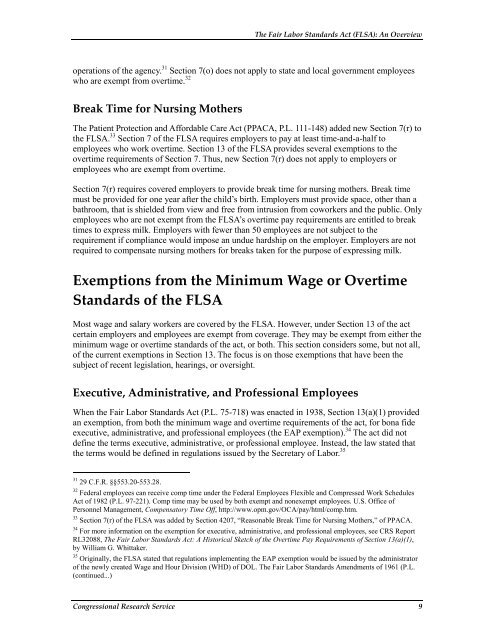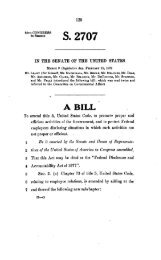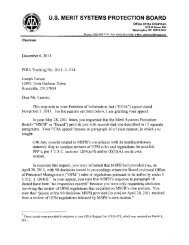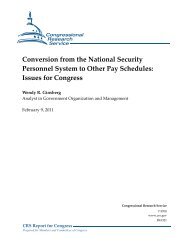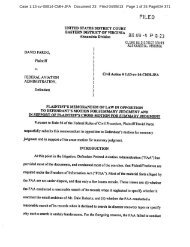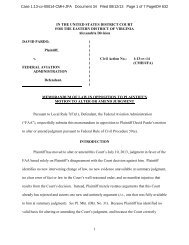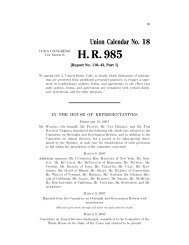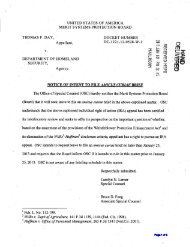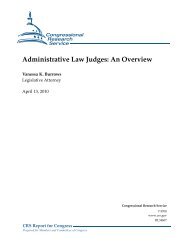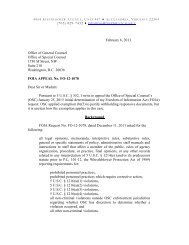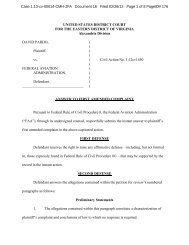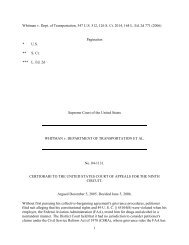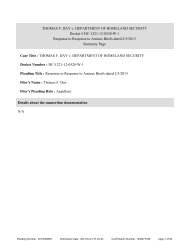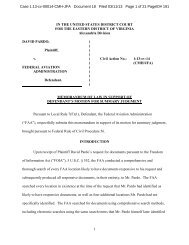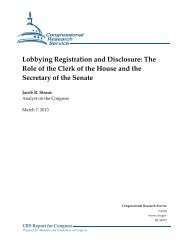The Fair Labor Standards Act (FLSA): An Overview - MSPB Watch
The Fair Labor Standards Act (FLSA): An Overview - MSPB Watch
The Fair Labor Standards Act (FLSA): An Overview - MSPB Watch
You also want an ePaper? Increase the reach of your titles
YUMPU automatically turns print PDFs into web optimized ePapers that Google loves.
<strong>The</strong> <strong>Fair</strong> <strong>Labor</strong> <strong>Standards</strong> <strong>Act</strong> (<strong>FLSA</strong>): <strong>An</strong> <strong>Overview</strong>operations of the agency. 31 Section 7(o) does not apply to state and local government employeeswho are exempt from overtime. 32Break Time for Nursing Mothers<strong>The</strong> Patient Protection and Affordable Care <strong>Act</strong> (PPACA, P.L. 111-148) added new Section 7(r) tothe <strong>FLSA</strong>. 33 Section 7 of the <strong>FLSA</strong> requires employers to pay at least time-and-a-half toemployees who work overtime. Section 13 of the <strong>FLSA</strong> provides several exemptions to theovertime requirements of Section 7. Thus, new Section 7(r) does not apply to employers oremployees who are exempt from overtime.Section 7(r) requires covered employers to provide break time for nursing mothers. Break timemust be provided for one year after the child’s birth. Employers must provide space, other than abathroom, that is shielded from view and free from intrusion from coworkers and the public. Onlyemployees who are not exempt from the <strong>FLSA</strong>’s overtime pay requirements are entitled to breaktimes to express milk. Employers with fewer than 50 employees are not subject to therequirement if compliance would impose an undue hardship on the employer. Employers are notrequired to compensate nursing mothers for breaks taken for the purpose of expressing milk.Exemptions from the Minimum Wage or Overtime<strong>Standards</strong> of the <strong>FLSA</strong>Most wage and salary workers are covered by the <strong>FLSA</strong>. However, under Section 13 of the actcertain employers and employees are exempt from coverage. <strong>The</strong>y may be exempt from either theminimum wage or overtime standards of the act, or both. This section considers some, but not all,of the current exemptions in Section 13. <strong>The</strong> focus is on those exemptions that have been thesubject of recent legislation, hearings, or oversight.Executive, Administrative, and Professional EmployeesWhen the <strong>Fair</strong> <strong>Labor</strong> <strong>Standards</strong> <strong>Act</strong> (P.L. 75-718) was enacted in 1938, Section 13(a)(1) providedan exemption, from both the minimum wage and overtime requirements of the act, for bona fideexecutive, administrative, and professional employees (the EAP exemption). 34 <strong>The</strong> act did notdefine the terms executive, administrative, or professional employee. Instead, the law stated thatthe terms would be defined in regulations issued by the Secretary of <strong>Labor</strong>. 3531 29 C.F.R. §§553.20-553.28.32 Federal employees can receive comp time under the Federal Employees Flexible and Compressed Work Schedules<strong>Act</strong> of 1982 (P.L. 97-221). Comp time may be used by both exempt and nonexempt employees. U.S. Office ofPersonnel Management, Compensatory Time Off, http://www.opm.gov/OCA/pay/html/comp.htm.33 Section 7(r) of the <strong>FLSA</strong> was added by Section 4207, “Reasonable Break Time for Nursing Mothers,” of PPACA.34 For more information on the exemption for executive, administrative, and professional employees, see CRS ReportRL32088, <strong>The</strong> <strong>Fair</strong> <strong>Labor</strong> <strong>Standards</strong> <strong>Act</strong>: A Historical Sketch of the Overtime Pay Requirements of Section 13(a)(1),by William G. Whittaker.35 Originally, the <strong>FLSA</strong> stated that regulations implementing the EAP exemption would be issued by the administratorof the newly created Wage and Hour Division (WHD) of DOL. <strong>The</strong> <strong>Fair</strong> <strong>Labor</strong> <strong>Standards</strong> Amendments of 1961 (P.L.(continued...)Congressional Research Service 9


